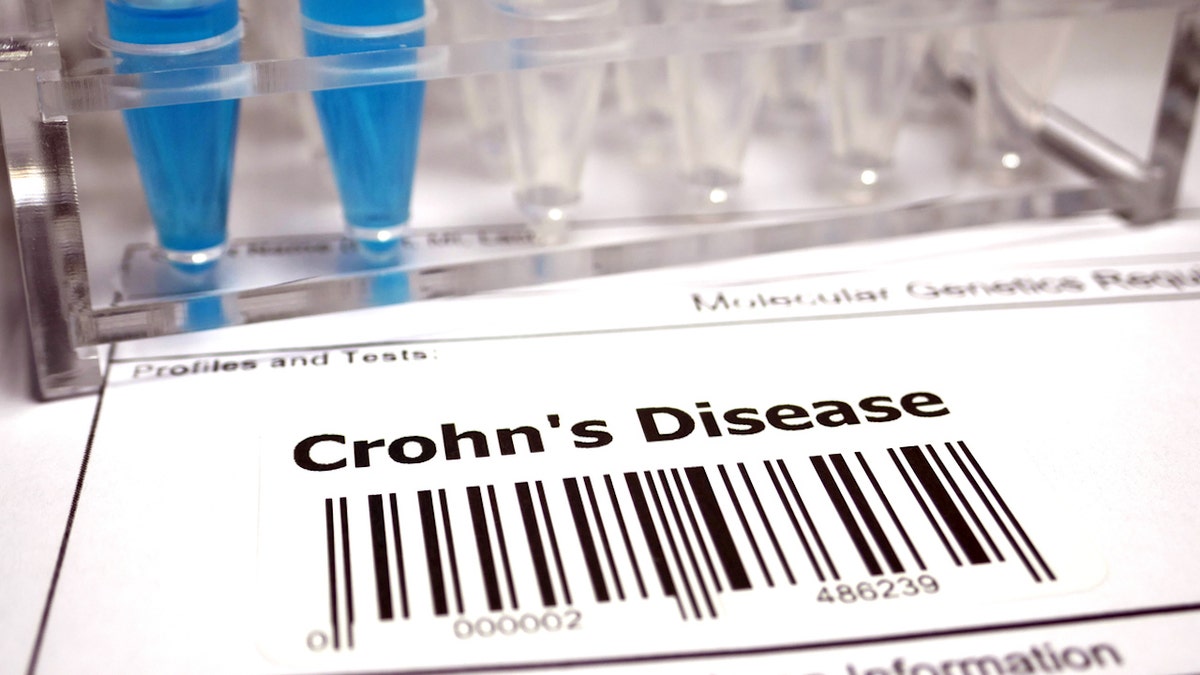Inflammatory bowel disease (IBD) — which includes Crohn’s disease and ulcerative colitis — affects around 3.1 million U.S. adults.
The disease can cause debilitating symptoms such as diarrhea, abdominal pain and cramping, blood in the stool and more.
Now, researchers at the U.K.’s Francis Crick Institute, working with UCL and Imperial College London, have discovered a genetic component — referred to as a “weak spot” in the DNA — that is present in 95% of those living with the disorder.
FIRST-EVER AUGMENTED REALITY ABDOMINAL SURGERY PERFORMED IN CHILE: ‘A REVOLUTION’
The study, published in the journal Nature earlier this month, identified a section of DNA that boosts the activity of a gene called ETS2.
ETS2 has been linked to inflammatory functions that increase the chances of IBD.

Inflammatory bowel disease (IBD) can cause debilitating symptoms such as diarrhea, abdominal pain and cramping, blood in the stool and more. (iStock)
Rosario Ligresti, M.D., chief of the Division of Gastroenterology at Hackensack University Medical Center in New Jersey, was not involved in the research but called the findings “quite important.”
CANCER PREVENTION IN THE ESOPHAGUS COULD BE JUST A PILL AWAY, DOCTOR SAYS: ‘TREMENDOUS BENEFIT’
“The researchers finally showed that all autoimmune and inflammatory disease — including IBD — appear to be caused by a single gene, ETS2,” he told Fox News Digital.
“The research identified this gene as a central regulator of a type of inflammatory cell called the macrophage, which is the main inflammatory cell in all these processes.”
“IBD usually develops in young people and can cause severe symptoms that disrupt education, relationships, family life and employment.”
“The more the gene was ‘turned on’ or amplified, the greater the risk of inflammation. Without this gene, these cells do not ‘turn on’ and there is no IBD.”
While diet and stress have long been suspected to worsen IBD, the exact “‘molecular switch’ that activates inflammatory bowel disease has been unknown until now,” Ligresti noted.

Inflammatory bowel disease (IBD) — which includes Crohn’s disease and ulcerative colitis — affects around 3.1 million U.S. adults. (iStock)
“This discovery is so exciting and significant because it only gives us a better understanding of the inner workings of the disease, and it will allow researchers to adapt existing drugs to finally treat it,” added Ligresti.
The research team is now investigating drugs that could reduce the activity of the ETS2 gene, thus reducing the occurrence of IBD.
HERE’S WHY YOU’RE BLOATED — AND WHAT TO DO ABOUT THE COMMON DIGESTIVE CONDITION
They found that a group of existing anti-inflammatory medications called MEK inhibitors could do the trick.
“Although there have been many factors suggested as risks for IBD, there is currently no way to prevent the onset of IBD,” Ligresti said.

“The researchers finally showed that all autoimmune and inflammatory disease — including IBD — appear to be caused by a single gene, ETS2,” a researcher (not pictured) told Fox News Digital. (iStock)
“We do know, however, that inflammatory pathways in the body are likely activated at least five years before the onset of symptoms of IBD.”
Ideally, he said, patients at increased risk could be given a drug during this window of time that could “nip IBD in the bud.”
CLICK HERE TO SIGN UP FOR OUR HEALTH NEWSLETTER
While more research is needed to find ways to deliver these MEK inhibitors to the target cells, Ligresti noted that this finding opens a “tantalizing door” to the future of very effective therapies to “shut off” inflammatory bowel disease.

The research team is now investigating drugs that could reduce the activity of the ETS2 gene, thus reducing the occurrence of IBD. (iStock)
James Lee, group leader of the Genetic Mechanisms of Disease Laboratory at the Crick, who led the research, agreed that better treatments are “urgently needed.”
“IBD usually develops in young people and can cause severe symptoms that disrupt education, relationships, family life and employment,” Lee said in a Crick press release.
CLICK HERE TO GET THE FOX NEWS APP
“Using genetics as a starting point, we’ve uncovered a pathway that appears to play a major role in IBD and other inflammatory diseases,” he said.
“Excitingly, we’ve shown that this can be targeted therapeutically, and we’re now working on how to ensure this approach is safe and effective for treating people in the future.”

Inflammatory bowel diseases, including Crohn’s disease and ulcerative colitis, often occur early in life, experts say. (iStock)
Lauren Golightly, 27, was diagnosed with Crohn’s disease in 2018 after experiencing stomach cramps, bleeding and irregular bowel habits, according to the release.
“I’ve had a rocky road since diagnosis, with many hospital admissions, several different medications and even surgery to have a temporary stoma bag,” she said in the release.
For more Health articles, visit www.foxnews/health
“I still experience flare-ups and can still spend quite a bit of time in hospital.”
She also said, “Learning about this research is so exciting and encouraging. I am hopeful this could potentially make a difference for myself and so many other hundreds of thousands of people living with IBD.”
Fox News Digital reached out to the researchers for additional comment.